How does marriage counseling work?
I was one of those people that had to be “dragged” to my first marriage counseling session ;).
One question I needed answered before I was ready to go was, “How does marriage counseling work?”
I was a little wary and uncertain (maybe scared, maybe even fearful) of how it all works!
So before committing, I needed comprehensive and honest answers. I felt not knowing put me on the back foot.
So I got the answers and the rest is history or part of our story.
You might be here for the same reason, asking the same questions. So here are all the answers that will help you...
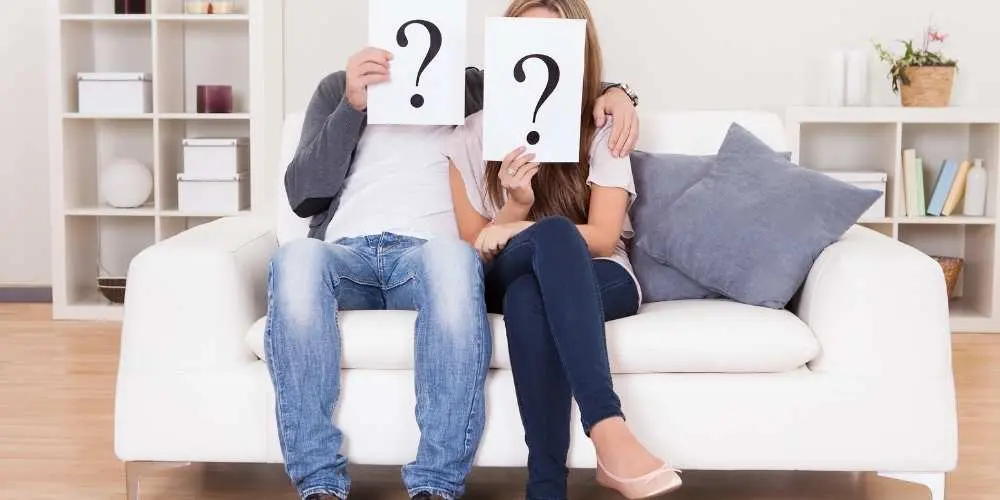 Make sure you get all the answers to "how does marriage counseling work?" before you commit to it.
Make sure you get all the answers to "how does marriage counseling work?" before you commit to it.Let’s get started with a short, concise and basic answer to your question, “how does marriage counseling work?” We will get into more detail after that.
An
ordeal to be endured or an adventure to be embraced?
Knowing what you are getting yourself into and specifically how it works can make all the difference!
Marriage counseling can be a journey of growth, understanding, healing and re-connection.
Many couples have reaped the rewards of making this a journey of rediscovery and positive change.
There are those that describe it as one of the best things they have ever done for their marriage.
 Knowing all you can about how marriage counseling works can make all the difference!
Knowing all you can about how marriage counseling works can make all the difference!Let’s face it; there is NO guarantee that it will work!
But knowing what the process is all about might give you more confidence, a bit of calm knowing what to expect, both from the process and from yourself.
The Marriage Counseling Journey 101: The Basics
Marriage counseling is basically therapy for married couples. You can also call it couples therapy.
Yes, there is a subtle difference, but to understand the basics, we can ignore these small differences (for now).
The marriage counseling process is designed to help you rebuild trust, find common ground, and rekindle the connection you once shared.
It's about learning how to navigate life's changes and challenges together and create a stronger, more fulfilling partnership.
Counseling consists of a number of sessions. You and your partner attend together and you are guided by a marriage counselor, therapist or coach.
The aim is to improve your relationship, regain connection, resolve issues, heal after major setbacks and learn tools to sustain and grow your relationship.
In each session you share your challenge/s and a good counselor will create a space where each of you feel comfortable to do this without feeling judged or without using the same patterns or conflict techniques that is keeping you stuck.
The counselor will then act as a guide and help you navigate your differences and resolve your issues.
You will also learn new tools to use going forward. We like to call these new ways to love, new ways to communicate or new ways to “show up” in your relationship.
Think of it as learning a new language, the language of healthy, mature, long-term relationships.
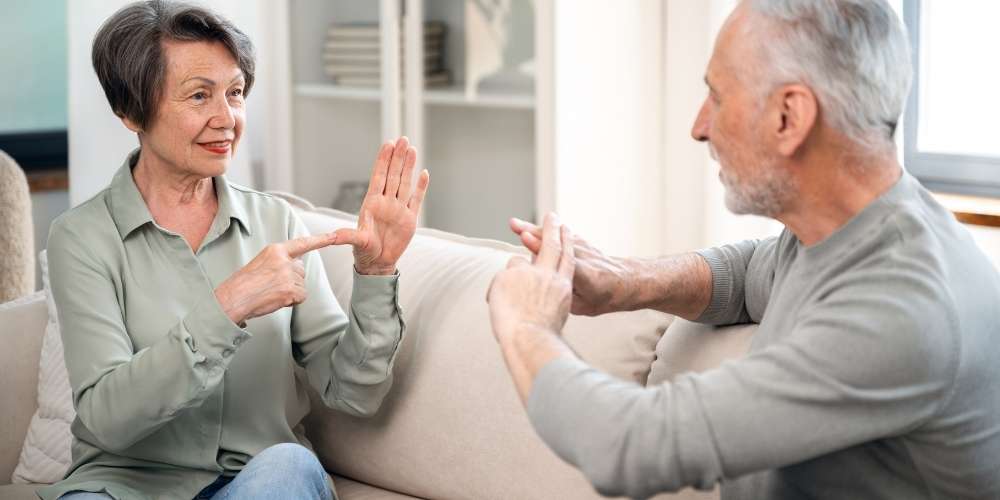 Marriage counseling includes learning how to communicate better and with new communication tools, almost like learning a new language.
Marriage counseling includes learning how to communicate better and with new communication tools, almost like learning a new language.There is no one-size-fits-all method approach, but most sessions follow a similar structure. We will look at the different steps or elements in more depth below.
But first, let's look at the following:
How
does marriage counseling work with
two people?
Most marriage counselors like to see both partners at the same time.
This makes sense if you think about it. Issues that arise in a relationship are created IN a relationship and it follows that these issues should be resolved by both partners IN the relationship.
Some methods require a few individual sessions especially at the beginning. This might be helpful where one or both partners are not comfortable to speak about their feelings in the presence of the other.
It’s also a good ideas to avoid initial conflict and issues with boundaries.
In these cases the marriage counselor will also invite the couple to address the issues together in a future session.
This is, after all, one of the main goals of mariage counseling: to help the couple resolve their issues together by communicating better and using new relational skills.
So
who is the client?
Is the client you or your partner?
Note that there are three parties in the room in addition to the marriage counselor. There is each of the partners in the couple, and there is the relationship itself.
Many therapists like to point out that the relationship is their client. They do their best to help the couple to save, improve and sustain the relationship.
The marrriage counselor also has to stay impartial and balance the needs and interests of all three parties involved.
How
does marriage counseling work? - A step-by-step guide
During the marriage counseling sessions themselves, you can expect a mix of talking, listening, and doing practical exercises or learning to use new tools.
It might feel uncomfortable at first but this is a new process you are learning so it is to be expected. Your therapist is there to guide you.
 The marriage counseling process has a logical structure which makes sense once we break it up into a few basic steps.
The marriage counseling process has a logical structure which makes sense once we break it up into a few basic steps.Let’s look at how marriage counseling works by explaining the process step-by-step.
(These steps are outlined in a specific order below. Some counselors won’t follow the same order but most of these elements will be present.)
Step 1: Introduction: Admin, confidentiality and policies
The first session (and sometimes the first few sessions) of a marriage counseling is usually used as an introduction and possibly to summarise some finer administration issues like policies and procedures.
This is important due to the fact that couples therapy involves two parties and both of you should be well informed and should give consent to these guidelines individually.
All marriage guides are bound to ethical codes with regards to confidentiality and privacy. If it is not explained make sure to ask about it.
Also ask if anything else is not clear or if you need more information. Your marriage counselor will be more than happy to explain.
Step
2: A roadmap
Apart from explaining confidentiality this intro phase will be used to broadly explain the process.
Let’s compare this to how a tour guide (on a hike or sightseeing tour) gives you an overview of where you will go and what you will see. Or how you will check a map to chart a journey or plan a trip.
 You are entering uncharted territory when going for marriage counseling and you need a guide to show you the way.
You are entering uncharted territory when going for marriage counseling and you need a guide to show you the way.
In the same way your marriage guide will give you:
- an overview of the process,
- what a typical session looks like,
- what method/s and tools they use,
- the ground rules when in session and
- the boundaries of the couple/counselor relationship.
Agreeing to this is crucial. Whether the both of you adhere to the roadmap, ground rules and role of the counselor as guide WILL determine the success of your journey.
Let's use the hike or adventure example again. If you don’t follow the map, listen to and trust your guide, use the tools provided and follow the rules they set you will not get to your destination!
You will probably get lost, get hurt or end up where you started and give up.
The same is true for marriage counseling!
Step
3:
Where are you
now?
The next part is about finding out where you are. Let’s liken this to a medical doctor doing a diagnosis or running some tests before deciding on treatment.
Your counselor will ask questions and listen to you to get to know you and your partner and to find out what you are struggling with.
This is where a marriage counselor might require individual sessions to gather historical data and background and give each of you the opportunity to air your opinions and feelings (without being judged or possibly interrupted by your partner).
Part of the exploration might include online or hard copy surveys and question forms you need to complete.
Let’s use an example. You might feel disconnected and believe your partner has stopped communicating with you.
Your therapist will ask you for examples, a history of events and give you an opportunity to explain the issue from your perspective.
Your partner might identify the same issue and get their opportunity to describe the situation from their perspective.
Or they might differ about the issues in your relationship and complain about you wanting to argue a lot and not giving them space.
The marriage counselor will give you each equal time and space to vent your frustrations and listen while making notes. See this as an assessment of sorts.
Why this assessment?
To know where you want to be they first need to determine where you are right now and what you are struggling with.
That might be different for both of you and that is OK! Your counselor needs to hear and listen to both points of view.
Step 4: Where do you want to be?
 At the start of your marriage counseling journey take some time to decide where you want to be, what your end goal is and what you want to achieve.
At the start of your marriage counseling journey take some time to decide where you want to be, what your end goal is and what you want to achieve.Once they know where you are now, your marriage counselor can ask you where you want to be i.e. what are you hoping to achieve with your time together.
You might not know exactly and your counselor will help you with this. It is important to set a goal or destination for your marriage counseling journey.
An example: A couple who find themselves thinking about divorce want to get back to a place where they have a joyful and healthy marriage.
Their aim would then be to explore and resolve the issues that got them to the brink of divorce.
Their end goal or destination is to have a fantastic marriage where breaking up is the furthest thing from their minds.
It is like any other journey, hike or adventure. You need to know where you are heading, what your goal is.
If you don’t know where you are going, how can you plan to get there?
Step
5:
The plan and
timelines
Once your marriage counselor knows your situation and what you want to resolve (including your goal) they will share what they plan to do to get you there.
This will not be a detailed plan but more of an overview of the tools they will share, how long it will take and the work you will do together.
The timeline will also be flexible and will depend on your situation and what happens in future sessions. Your therapist will be able to give you a good estimate.
You will now learn, practise and start applying new tools that will help you reach your goals.
Step
6:
Nearing the
summit
Imagine you are climbing a hill (attending sessions, learning tools, and applying them) assisted by your guide (marriage counselor).
As you continue to climb (doing the work, testing the tools at home) you get closer to the top of the mountain (your relationship goal).
Towards the end you get better at using new relationship tools and you start resolving some issues between you.
Your guide (counselor) starts trusting you to use more of the tools on your own and your sessions might also become less frequent.
 Towards the end of your marriage counseling process you will feel as if you have developed new relationship muscles that have take you closer to your goals.
Towards the end of your marriage counseling process you will feel as if you have developed new relationship muscles that have take you closer to your goals.Don’t give up or slack now! Many couples are so relieved that things are getting better that they ignore the hard work they still need to do to get to the top! This last stretch is crucial in achieving in your goals.
Even more important is what happens next...
Step
7:
Staying at the
top!
At the end of the process you would hopefully have resolved your issues and reached your relationship goals. If not you could be well on your way and you have the tools and know-how to use them to get there.
Once you get to your ideal destination you want to stay there, right? It will be easy to fall back into old habits, stop learning new tools and stop applying what your guide has taught you.
Once old habits return many couples go right back where they started. So the phase after your marriage counseling sessions are done is all important.
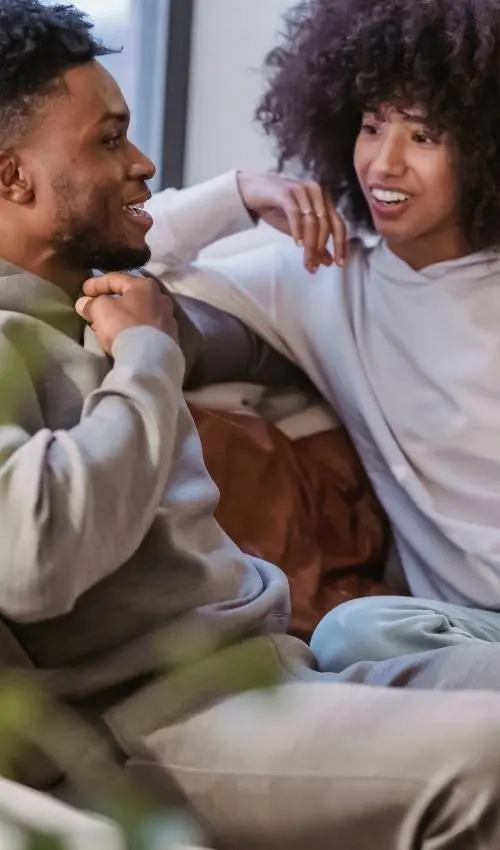 After you have achieved the goals by doing marriage counseling you need to sustain the momentum by creating and sustaining new healthy relationship habits.
After you have achieved the goals by doing marriage counseling you need to sustain the momentum by creating and sustaining new healthy relationship habits.You have to implement the changes your mariage guide pointed out, keep doing the work and keep using the tools. If you do this your awesome marriage adventure will continue.
Do not underestimate the value of follow-up or check-in sessions. Your marriage counselor can help you check your progress, work on more unresolved issues or guide you and remind you of the tools you might have neglected.
Regularly scheduled follow-up sessions (monthly, quarterly or bi-yearly) help you keep on the right track.
It might just be the difference between slipping back into your old ways or enjoying a fantastic relationship.
VERY
IMPORTANT: What happens between sessions?
A very important part of this step is the “homework” you will need to do between sessions. Your mariage counselor will show, demonstrate and help you learn new tools and then invite you to “try” these tools at home.
This will empower you to start using these tools on your own without guidance and to keep using the tools in future.
You can imagine the importance of committing to the work between sessions. Without it there won’t be much progress and you will need marriage counseling indefinitely.
How does marriage counseling work: The toolkit
Most marriage counselors try to make sessions as practical as possible. They use tools to help you resolve the stuff that is bothering you. They also teach you these tools so you can start using it at home and keep using it to sustain what you have built.
These tools typically include skills that help or teach you to...
- listen better
- practise active listening
- listen reflectively
- accept and forgive
- communicate better
- understand better
- differentiate between different viewpoints and worldviews
- understand nad use body language better
- express your desires and needs better
- handle different types of conflict
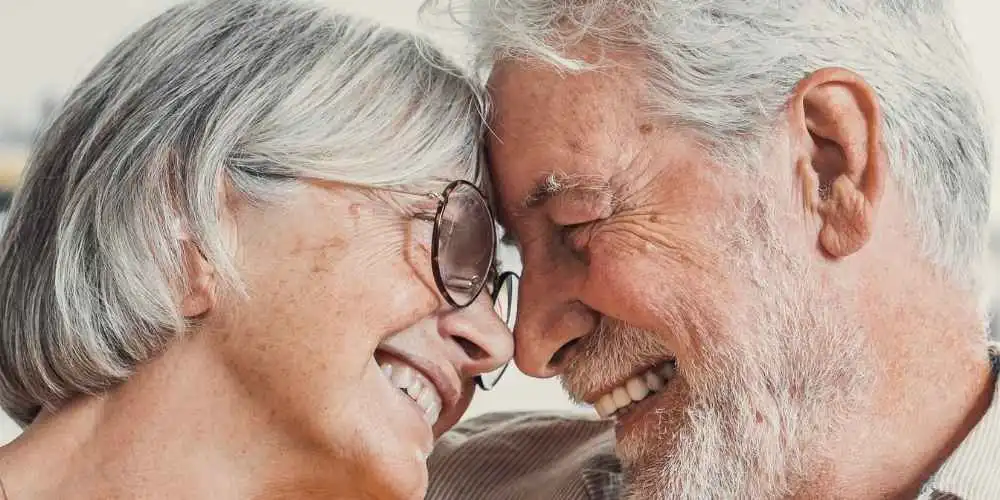 What you learnt in marriage counseling will only work if you keep using the tools you now have.
What you learnt in marriage counseling will only work if you keep using the tools you now have.Communication
tools
There is always a big focus on communication Your therapist will teach you how to communicate your feelings clearly and respectfully and also how to listen actively.
This can be a game-changer in resolving long standing issues and conflict.
Above all, this toolkit will empower you to deal with future issues and communicate much better in general.
Habit
and behaviour change tools
Some tools are specifically geared in helping you identify bad habits and nurture good ones.
This is something you will start practising in session. It is also something that needs to continue at home when you are no longer seeing your marriage counselor.
We know the only way to make a habit or new behaviour stick is to practise and repeat it over and over again. If you stop after your therapy ends you will simply go back to the old bad habits.
So a big part of how marriage counseling works is integrating, practising and sticking to new behaviours and habits.
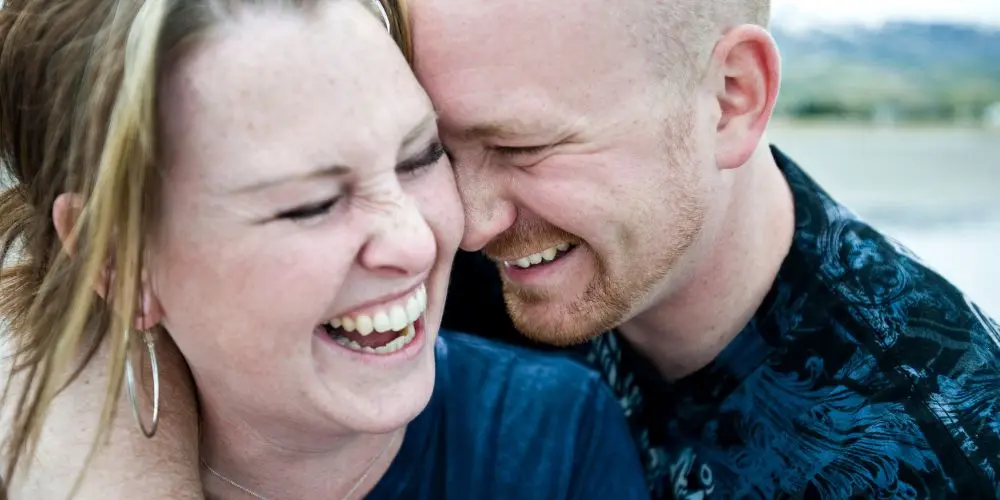 Less fighting and conflict and more joy and fun are the results of a couple sticking to the new habits they started forming during marriage counseling.
Less fighting and conflict and more joy and fun are the results of a couple sticking to the new habits they started forming during marriage counseling.How
does couples counseling work in terms of frequency and duration?
Typically, sessions are held weekly or bi-weekly, and the overall length of therapy varies depending on the couple's needs and progress.
Some couples might see significant improvement in a few months, while others might benefit from longer-term therapy.
Each session could be anything from 45 minutes to two or even three hours. Some therapists even like to schedule half-day or full-day "ïnterventions" where a couple commits to a few hours of consecutive therapy.
The duration and frequency should be discussed as part of the plan proposed by the marriage counselor.
How
does couples counseling work?: The role of the marriage counselor
Think of your therapist as a relationship coach. They provide guidance, support, and tools to help you navigate the ups and downs of your relationship.
They don't take sides or tell you what to do; they empower you to make the best decisions for your partnership.
How
does couples counseling work? Your role
What is expected of you in marriage counseling?
The following is very important and you can take it as a given that everything here is applicable to both of you:
- Committing to the process
- Willingness from both partners to work hard in and outside (between) sessions
- Open to feedback, self reflection and new learnings
- Embracing uncertainty and vulnerability
- Trusting the process
- Being patient with yourself and your partner
- Being honest and transparent
 There's is nothing to fear from marriage counseling if you know what you are letting yourself into.
There's is nothing to fear from marriage counseling if you know what you are letting yourself into.Conclusion
It's important to remember that marriage counseling is not a magic bullet. It takes time, effort, and commitment from both partners.
Hopefully you now know more about how it works than before!
If you are both willing to put in the work, it can be an incredibly rewarding experience.